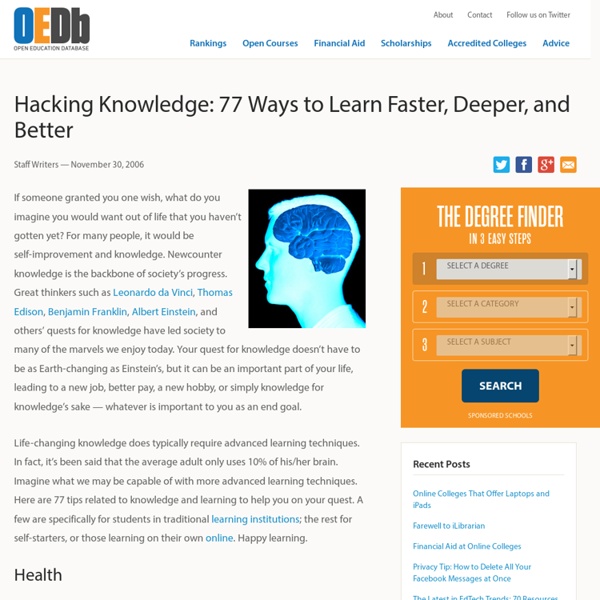How To Learn On Your Own: Make A Personal Scholar Resource Plan
One of the most challenging and gratifying parts of learning alone is the opportunity to search for and select your own learning material. Students in traditional classrooms usually don’t get to decide how they are going to master course content. Instructors decide for them in the form of textbook selection, quizzes, tests, group projects, etc.
How to become smarter by doing less in the information age
Common: Believing that focusing on detail is the only and best path to success. Uncommon: Let’s be honest: Most things studied in college are quickly forgotten. I believe this is partly due to the sheer number of concepts addressed per class, per semester.
Brain Structures and Their Functions
The nervous system is your body's decision and communication center. The central nervous system (CNS) is made of the brain and the spinal cord and the peripheral nervous system (PNS) is made of nerves. Together they control every part of your daily life, from breathing and blinking to helping you memorize facts for a test.
Finite Attention Span
One Friday in May of 2011, I locked up my shared office, went to the pub with some colleagues and students, and said goodbye to my job as a senior lecturer in psychology. On the following Tuesday (it was a bank holiday weekend) I started a three-month stint as an intern at a then-mid-sized software company. They were pretty clear that there wouldn’t be more work at the end of it; all I had going for me was that they were paying me — a lot less than my academic job paid, but hey, it was money. (Let’s not even start on the ridiculous exploitation of young people by companies looking for free labour, or how unpaid internships exclude those who can’t afford to work for free.) Anyway, so … lunacy, right?
Top 100 Tools for Learning 2009
Top 100 Tools for Learning 2009 as at 15 November 2009 This list has been compiled from the contributions of 278 Learning Professionals worldwide, whose individual contributions you can read here Here is a presentation of the Top 100 Tools. Below you can see the full list with links to pages with more information about each of the tools. KEY F = Free, C= Commercial, W = Windows, M=Mac, S=Server, O = Online Cells shaded blue are new tools on the list this year Cells shaded green are tools returning to the list this year C urrent ranking in 2009
About this site - Notes from a Linguistic Mystic
This site exists both as a place for me to post the things that intrigue me and make me think, but also as a place for you to find and learn about things that might intrigue you. I’ll do my best to write in such a way that you don’t need a background in Linguistics to understand my posts, and always feel free to comment if you don’t understand something. I’ll post a clarification as soon as I can. Although I’m a Linguist by trade and by passion, some what I’m discussing on this site might fall outside of mainstream linguistics. I’ll always do my best to be factually accurate in areas where facts exist (and corrections are encouraged), but I’ve chosen this site and this name to emphasize that this is my own personal site, pulling in information from my life and my many passions, rather than just from a linguistics textbook.
Mind Mapping, Concept Mapping, Argument Mapping: What are the differences and Do they Matter? (Martin Davies)
Concept mapping, mind mapping and argumentmapping: what are the differences and do they matter? Martin Davies Springer Science+Business Media B.V. 2010 Abstract
World's most detailed scans will reveal how brain works
5 March 2013Last updated at 13:27 ET By Pallab Ghosh Science correspondent, BBC News Continue reading the main story Daydream Believer: an MRI scan of the brain at rest.
How to be disruptive: a retrospective primer, with meerkats.
‘Disruptive’ doesn’t mean what it used to mean. Being disruptive used to mean you’d be in trouble pretty soon: with your teachers, your parents; with other kids’ parents. You know — grown-ups. Back then, being disruptive was seen as bad, and not something that would get you very far in life, beyond maybe the head teacher’s office. Times change.



